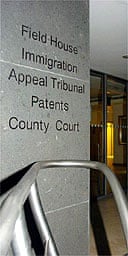The government's anti-terror policy was dealt a big blow today as two Libyan terror suspects won their appeals against an attempt to deport them.
The Special Immigration Appeals Commission allowed the appeals by the two Muslims, who could only be identified by the initials DD and AS, ruling they risked being tortured and executed if returned to their native country.
The special anti-terrorist court ruled that both DD and AS were a threat to national security. The judges described DD as a "global jihadist with links to the Taliban and al-Qaida" and identified him as the brother-in-law of the suspected ringleader of the Madrid bombings, which killed 191 people in 2004. AS is an Islamist extremist "clearly engaged in support of jihadist activities", the judges said.
The Liberal Democrat peer and terrorism expert Lord Carlile told Guardian Unlimited that today's ruling had constitutional implications and the courts were "in effect now saying they can review foreign policy decisions on a case by case basis".
Today's case was the first test of a crucial diplomatic agreement - known as a "memorandum of understanding" (MoU) - that the government signed with Tripoli to remove suspects without breaching human rights laws.
The Siac chairman, Mr Justice Ouseley, said in his ruling (the107-page document can be read here) that there remained a real risk that the European convention on human rights could be breached if the two men were removed to Libya, although he indicated it was not a probable risk.
The two men will be freed within days with a strict set of bail conditions, including a daily 12-hour curfew. The Home Office had opposed bail on the grounds that they would abscond if let out of Long Lartin maximum security prison, where they have been under immigration detention.
However, a Siac judge, Mr Justice Mitting, said keeping them in detention after they had won their appeal would be on the "cusp of legality".
The court heard that MoUs are a key plank of the Home Office's policy on dealing with foreign terror suspects who cannot be prosecuted in UK courts.
A series of agreements have been signed with Middle Eastern and North African countries seeking guarantees that any of their citizens deported by Britain will not face torture or ill-treatment.
"It was common ground between the government and the men's lawyers that political opponents of the Gadaffi regime are reasonably likely to be tortured or otherwise ill-treated if returned to Libya," the solicitors for DD and AS - Birnberg Peirce & Partners and PRP Solicitors - said in a statement.
"The government contended, however, that DD and AS would not be tortured or ill-treated because of the specific assurances given by the regime and the existence of the monitoring body (and organisation which would keep tabs on the deported men).
"Both men were found by Siac to be a risk to national security. However, neither they nor the lawyers were permitted access to large parts of the evidence which formed the basis of these conclusions against them."
The Home Office said it was "very disappointed" and would appeal today's ruling.
"We believe that the assurances given to us by the Libyans do provide effective safeguards for the proper treatment of individuals being returned and do ensure that their rights will be respected," a spokesman said.
"We firmly believe that our policy of seeking assurances from other countries in respect of those considered to pose a threat to national security strikes the right balance between safeguarding their rights and enabling us to protect the British public and Siac has accepted this previously."
Lord Carlile said he was "not surprised that some MoUs appear to have more weight than others" and today's ruling put the government in a quandary.
"It is now clear that these not only have to be considered on a country by country basis but also case by case. That is not unreasonable but it does place the government in a dilemma about how best to act in the public interest because Siac ruled that DD and AS were a risk to national security. Unless it is overturned by the court of appeal they cannot be returned despite the MoU. So the question arises about what the government should do with them."
He said the court's ruling had constitutional implications.
"The home secretary and the foreign secretary are saying that they have concluded that it is safe for these people to be deported to Libya. The courts in effect are now saying they can review foreign policy decisions on a case by case basis. That is why it is so important."
The Amnesty International UK director Kate Allen said: "Amnesty has long argued that MoUs offer no protection from torture and are not worth the paper they're written on.
"The government should now look very seriously at the whole principle of MoUs. Britain should not be trying to cut deals with torturers. If people are suspected of committing a crime, they should be charged and put on trial."
Today's ruling is the latest in a series of battles between the government and the courts in dealing with terror suspects. In February, the Home Office won a landmark ruling to deport Abu Qatada to Jordan on the back of a MoU.
In another judgment, last year, Siac "gave some weight" to the assurances from Algerian authorities about returning to his home country a man cleared of any involvement in the supposed "ricin plot".
"We have concluded that they are acting in good faith; the political changes demonstrate their will and the level and consistency of the assurances support that," Mr Justice Ouseley ruled at the time.
